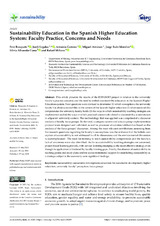Sustainability Education in the Spanish Higher Education System: Faculty Practice, Concerns and Needs
Autor
Busquets, Pere
Segalas, Jordi
Gomera Martínez, Antonio
Antúnez López, Miguel
Ruiz-Morales, Jorge
Albareda-Tiana, Silvia
Miñano, Rafael
Editor
MDPIFecha
2021Materia
SustainabilitySustainable development
Education for sustainable development
Higher education
University faculty’ perception
Focus groups
METS:
Mostrar el registro METSPREMIS:
Mostrar el registro PREMISMetadatos
Mostrar el registro completo del ítemResumen
This article presents the results of the EDINSOST project in relation to the university faculty’s practice concerns and the need to embed sustainability education in the Spanish Higher Education system. Four questions were devised to determine (1) which conceptions the university faculty has about sustainability in the context of the Spanish higher education (2) what sustainability competencies the university faculty holds (3) the ways in which sustainability teaching strategies are implemented and (4) the ways in which practical coursework related to sustainability is undertaken in a Spanish university context. The methodology that was applied was comprised of a discourse analysis of faculty focus groups. To that end, a category system and a focus group implementation protocol were designed and validated, as well as processes of construct elaboration based on the analysis of the focus groups’ discourses. Among the most relevant contributions stemming from the research questions regarding the faculty’s assumptions was the evidence that the holistic conception of sustainability is not addressed in all its dimensions and the environmental dimension is overemphasised. The need for training to teach sustainability competencies and the faculty’s lack of awareness were also identified. As far as sustainability teaching strategies are concerned, project-based learning prevails, with service-learning emerging as the most effective strategy, even though its application is hindered by faculty training gaps. Finally, the absence of sustainability in teaching guides and study plans and the scarce institutional support for establishing sustainability as a strategic subject in the university were significant findings.

